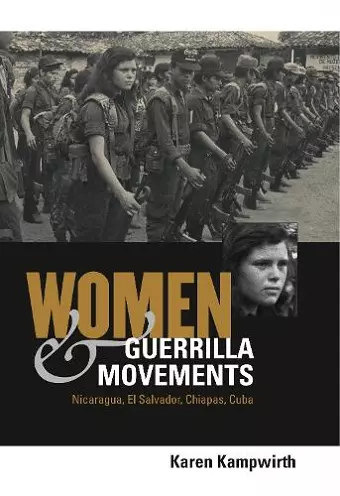Women and Guerrilla Movements
Nicaragua, El Salvador, Chiapas, Cuba
Format:Paperback
Publisher:Pennsylvania State University Press
Published:15th Jun '03
Currently unavailable, and unfortunately no date known when it will be back
This paperback is available in another edition too:
- Hardback£36.95(9780271021850)

The revolutionary movements that emerged frequently in Latin America over the past century promoted goals that included overturning dictatorships, confronting economic inequalities, and creating what Cuban revolutionary hero Che Guevara called the "new man." But, in fact, many of the "new men" who participated in these movements were not men. Thousands of them were women. This book aims to show why a full understanding of revolutions needs to take account of gender.
Karen Kampwirth writes here about the women who joined the revolutionary movements in Nicaragua, El Salvador, and the Mexican state of Chiapas, about how they became guerrillas, and how that experience changed their lives. In the last chapter she compares what happened in these countries with Cuba in the 1950s, where few women participated in the guerrilla struggle.
Drawing on more than two hundred interviews, Kampwirth examines the political, structural, ideological, and personal factors that allowed many women to escape from the constraints of their traditional roles and led some to participate in guerrilla activities. Her emphasis on the experiences of revolutionaries adds a new dimension to the study of revolution, which has focused mainly on explaining how states are overthrown.
“This is an intelligent and well-researched book—essential reading for helping academics and practitioners think through the complexities of women’s lives during and after revolutions. Kampwirth’s book will chart a new course for us to study women as individuals, not just as a group, with regard to political and social revolutions. A book that superbly captures the real lives of women revolutionaries—without over-romanticizing the revolutions or the roles of women.”
—Tracy Fitzsimmons,Shenandoah University
“Karen Kampwirth has here made a fundamental contribution to the literature on revolutions, weaving together structural political economy and personal stories in a provocative, soundly argued way. The stories are fascinating and gripping, the ideas striking and powerful, the writing highly engaging. The theoretical framework, based on a combination of structural and personal factors, is wise, inventive, and sound, and is tested with some very original and hard-to-get empirical data from four cases—Nicaragua, El Salvador, Cuba, and Chiapas. It will be widely seen as the essential work on the increasingly studied topic of women and revolution.”
—John Foran,University of California, Santa Barbara
“Why, then, yet another book on guerrilla movements? Karen Kamwirth shows us why in Women and Guerrilla Movements.
Kampwirth’s analysis thus, implicitly, leaves us with a frame to better understand how movements in the post-Cold War are likely to be different in form and content than earlier movements.”
—Susan Eckstein Perspectives on Politics
“Overall, this is an important and engaging book.”
—E-Extreme
“Without a doubt, such a perspective raises new issues for research, while also focusing on old ones, and helps one gain a better view of gender politics within individual countries and societies.”
—Inabel Ofer E.I.A.L.
“Karen Kampwirth’s Women and Guerrilla Movements is an exceptional contribution to revolutionary studies. Through her analysis of female guerrillas in Nicaragua, El Salvador, Chiapas and Cuba, she demonstrates that by excluding gender from their analysis, the vast majority of scholars of revolutions have missed key dynamics.
In sum, Women and Guerrilla Movements is a coherent, engaging, well-researched, and thoughtful development in revolutionary studies.”
—Jeffery R. Webber Canadian Journal of Political Science
“Kampwirth provides an excellent synthesis of existing studies, documents, and theories. Her cross-national analysis highlights the similar structural and cultural patterns found across multiple movements, and she critically outlines the macro-level changes that made possible women’s increased political activism in recent decades. Kampwirth demonstrates unequivocally the necessity for incorporating gender into any explanation of revolutionary movements.
Kampwirth’s book provides an excellent foundation from which future studies will no doubt begin their discussion.”
—Jocelyn S. Viterna Journal of Gender Studies
“This book is most illuminating when it delves into the details of particular women’s lives.”
—Janise Hurtig and Rosario Montoya Latin American Research Review
“An excellent addition to the literature, this volume will be of great interest to scholars interested in the long history of populism and will also make an accessible and thought-provoking addition to the reading lists of students of modern Latin American history and Latin American gender studies.”
—Amelia M. Kiddle Journal of Latin American Studies
ISBN: 9780271022512
Dimensions: 229mm x 152mm x 14mm
Weight: 340g
208 pages